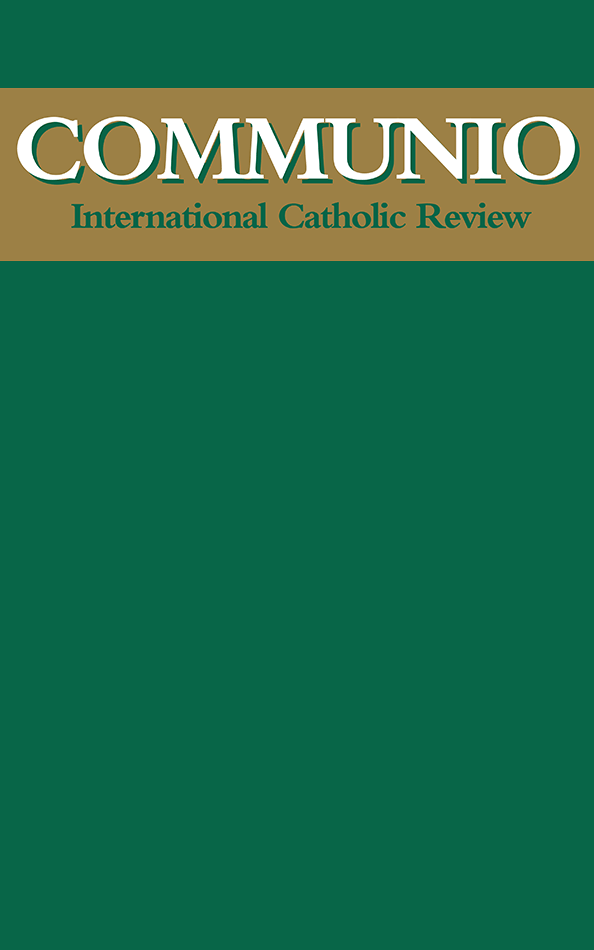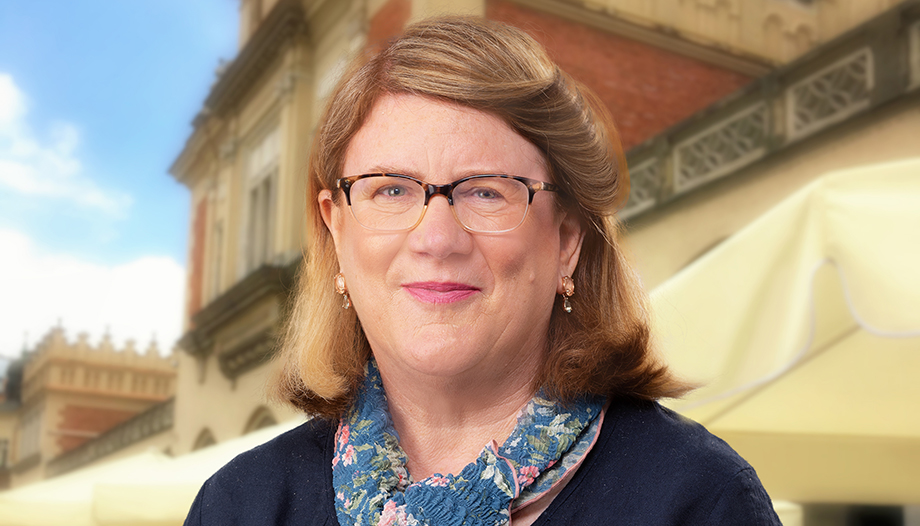Tracey Rowlandwinner of the Ratzinger Prize 2020, was the keynote speaker at this meeting in which Pablo BlancoThe forum was introduced and moderated by the priest and professor at the University of Navarra, Spain.
In her speech, after presenting the speaker's curriculum vitae, she emphasized how, with the appearance of the publications "Hochland y Communiothe theological airs are changing. In the Anglo-Saxon sphere, as Rowland proposes, the theological Radical OrthodoxyRadical Orthodoxy, a movement that emerged in Cambridge in the nineties of the last century, and which proposed something as unenlightened and postmodern as the value of the liturgy as a theological place, among other proposals".
Blanco also pointed out that "Tracey Rowland reminds us that Joseph Ratzinger's proposal is not only a Christianization of culture, but a 'Trinitarianization' of it: a Trinitarian reading of culture".
Hochlandan integrating vision
The 2020 Ratzinger Prize in Theology, Tracey Rowland, began his speech by recalling how the relationship and interest between theology and culture dates back to the last years of the 19th century and, especially, to the beginning of the 20th century with the founding of the magazine Hochland by Carl Muth who sought to achieve in Germany what he had experienced in France where "believing Catholics moved with great freedom in the intellectual elite of the country, participating in the great discussions as equal partners". HochlandThe magazine, Professor Rowland recalled, "was published between 1903 and 1971 with a five-year closure between 1941-46 due to Nazi opposition to its editorial line.
Hochland differed from other Catholic journals in that it published articles from across the spectrum of the humanities, not only essays on theology and philosophy, but works on art, literature, history, politics and music. It was, then, one of the first attempts to offer reflections on cultural life through the lens of theology and philosophy and other humanities disciplines." A publication, as Rowland defined it, "open to the integration of disciplines and a worldview composed of multidisciplinary elements".
"Hochland was one of the first attempts to offer reflections on cultural life through the lens of theology."
Tracey Rowland. Ratzinger Prize 2020
Communio: International Review
Hochland would be the precursor of Communio: International Review, founded by Hans Urs von Balthasar, Henri Lubac and Joseph Ratzinger, of which one of its distinctive features is "its attention to the relationship between faith and culture and the offer of theological analyses of contemporary cultural phenomena". Racey Rowland has pointed out "the close synergy between the line of Communio and the movement of the Radical Orthodoxy (Radical Orthodoxy)", to which names such as John Milbank, Catherine Pickstock or Graham Ward belong.

Both these and the drivers of Communio "they want to dialogue with culture, but "they refuse to dialogue with culture in non-theological terms." In this line, Rowland has taken up the affirmation of Bishop Robert Barron, of Los Angeles, that "when it comes to thinking about the relationship between theology and culture, the most fundamental question is that of whether Christ positions culture or whether culture positions Christ".
"Ratzinger - Dr. Rowland continued - advocates a complete Trinitarian transformation of culture, not only a Christological transformation, but a Trinitarian transformation. One finds the fundamental principle of this transformation expressed in the document 'The Trinitarian Transformation of Culture'.Faith and Inculturation'.published by the International Theological Commission then under the direction of Ratzinger".
Rowland has brought up Aidan Nichols OP's expression, "Trinitaria cabs".to describe "how the domains of culture can be appropriated by the different Persons of the Trinity" so that "cultures can be analyzed theologically by asking questions such as: what are the origins and goals of this culture? How are the elements that make up the culture integrated or related to each other? And, what spirituality/ies governs the moral ethos of this culture?
The mass man and evangelization
The names of Christopher Dawson and Romano Guardini are key in the development of these concepts. Especially Guardini, Rowland has continued, some of whose works "especially his Letters from Lake Como, The end of the modern world y Freedom, grace and destinyexplain how the culture of modernity has the shape of the machine and how the mass mandisconnected from the culture of the Incarnation, has become culturally impoverished by systematically lowering its spiritual horizons". Rowland has underlined how in his work "''The end of the modern worldGuardini established a connection between the character of the mass man and the problems of evangelization in the contemporary world. He described the mass man as an unwilling person, vulnerable to ideological manipulation, and identified the cause of this disposition as a causal relationship between the lack of a fruitful and elevated culture."
Rowland has pointed out another theological element of the Trinitarian transformation of culture present in Guardini's work: the precedence of the Logos at ethos. For this theologian, the opposite fact, i.e., the priority of the ethos on the Logos is the cause of what he knew as the pathological dimensions of the culture of modernity. "Once the importance of ontology is denied there is no way to link the faculties of the human soul such as intellect, memory, will, imagination and the heart understood as the point of integration of all these faculties with the theological virtues (faith, hope and love) and the transcendental properties of being (truth, beauty, goodness and unity)."
The trinitarian transformation of culture
"If the human person is made in the image of God to grow in the likeness of Christ, then Trinitarian theology is absolutely foundational to any theology of the human person and any theology of culture." Rowland has not denied that "although the the theology of culture of Joseph Ratzinger and his colleagues of Communio could be described as 'principles for a Trinitarian transformation of culture', and while there may be many aspects of this theology that are shared with scholars in Radical Orthodoxy circles who come from Reformed ecclesial communities, there are, nevertheless, alternative and indeed antithetical approaches to the relationship between theology and culture currently in the 'marketplace' such as the correlationist theology promoted by Edward Schillebeeckx.
The professor of the University of Notre Dame also referred to the positions developed by Hans Urs von Balthasar, a follower of Guardini, contrary to the notions of correlationism since it presupposes an extrinsic relationship between Christ and the world while, according to Urs von Balthasar: "Christians do not need to reconcile Christ and the world with each other, nor mediate between Christ and the world: Christ himself is the only mediation and reconciliation. He also recalled another criticism of this theologian, what he called the "distillation of values" and which refers to a process that "distills" so-called Christian values and "sells" them to the world "without burdening non-Christians with the theological beliefs from which the values were distilled. once the so-called 'values' have been distilled from Christian doctrines, they tend to 'mutate', take on new meanings and serve anti-Christian ends. Numerous scholars have pointed to the fact that the most violent forms of anti-Christian ideology are always parasitic on Christian teaching."
The iconoclastic danger
Rowland has dwelt, finally, on what "Ratzinger calls the danger of 'iconoclasm'. It is the fear of affirming beauty and high culture. An idea that Tracey Rowland recalled "has had a strong presence in Protestant theology. In this sense: "beauty and high culture were associated with Baroque and Counter-Reformation Catholicism, and since Baroque scholasticism was not fashionable, everything that went with Baroque scholasticism became unfashionable. In some parts of the Catholic world this included solemn liturgy and its replacement with what Ratzinger calls 'parish tea party liturgy'. In other parts of the Catholic world, solemn liturgy and beautiful ecclesiastical furnishings, vestments and sacred vessels, became associated with the world of upper class Catholicism and were considered incompatible with the preferential option for the poor". This iconoclasm "is not a Christian option, as Ratzinger declared, since the Incarnation means that the invisible God enters the visible world".
"The theological vision of Communio circles works for a new Trinitarian transformation of all dimensions of our culture."
Tracey Rowland
"The theological vision of the circles of Communio"Rowland concluded, is "not to lower the horizons of faith to the dimensions of mass culture nor to enter into the counterproductive process of distilling Christian values from Christian doctrine, but to work for a new Trinitarian transformation of all the dimensions of our culture".
The meeting closed with a lively colloquium between spectators and speakers in which topics such as the "re-contextualization" of faith in the culture of post-modernity, the role of the media in this relationship between theology and culture or the consistency of proposals such as those of the recently deceased Hans Küng with his world ethics were discussed.
Regarding the relationship between social theories and theology, Professor Rowland pointed out during the colloquium that the necessary role of these theories must be recognized. However, in accordance with the thesis that it is Christ who "positions" culture and not the latter to Christ, the tradition of faith cannot be left aside when evaluating them. The Lord himself sent the disciples to convert everyone, and not simply to compare the values of different religious groups. "Faith is not just another commodity in the marketplace," Rowland said. Therefore, "if the Catholic intellectual elite simply assume fashionable beliefs, the end result would be that Catholics would become children of their time, and nothing more. They would lose their connection to the truth, and that would be a terrible tragedy, especially for the younger generation. We have to have the courage to explain the faith."








